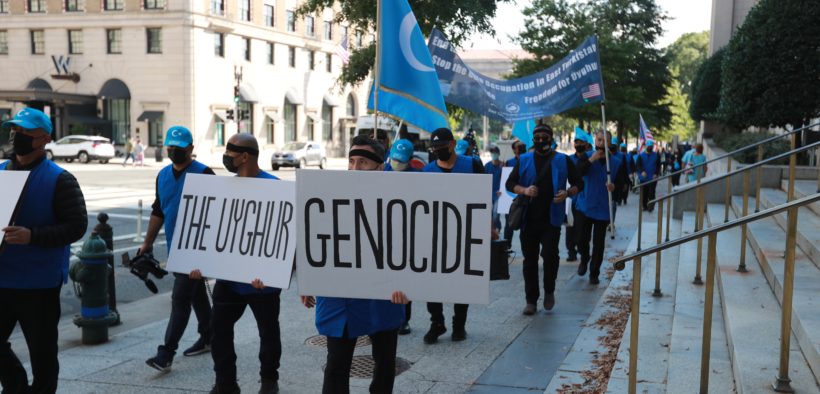China’s Human Rights Violations in Xinjiang
Share

Image Credits: @kuzzat on Unsplash (Unsplash License)
The Uyghur people are a Turkic, largely Muslim ethnic group that live in Xinjiang, a region in Northwest China. Since the current Chinese government’s annexation of Xinjiang in 1949, the Uyghur people have endured decades of oppression, intensifying in recent decades, under Chinese Communist Party rule. Millions of Uyghurs have been unjustly detained, many have suffered forced labor, torture, and political oppression, and China has even attempted to erase Uyghur culture. This article will examine China’s human rights abuses, evaluating which international laws the Chinese government has violated.
Political Oppression:
At the core of China’s oppression of the Uyghur people is the government’s detainment of millions of Uygurs based on a fabricated claim that the Uyghurs are a terrorist threat to China. China employs this narrative to explain their “reeducation” facilities and justify their repression of both Uyghur cultural and political life. However, experts say this claim is merely a ruse fabricated by China after 9/11 to abuse the international community’s focus on counterterrorism to legitimize their mistreatment of the Uyghurs. As a result, China has expanded their surveillance and detainment of Uyghurs in Xinjiang in recent decades.
According to the Human Rights Watch, the number and duration of prison sentences in Xinjiang has increased in recent years, while simultaneously “the courts in Xinjiang have convicted and imprisoned many people who had not committed a genuine offense.” Furthermore, the Uyghur Human Rights Project reported that the Chinese government has begun targeting Uyghur elites, finding that “at least 312 Uyghur and other Turkic Muslim intellectual and cultural elites are currently being held in some form of detention.”
These unjust prison sentences violate both the International Covenant on Civil and Political Rights and the Universal Declaration of Human Rights. Article 1 of the International Covenant on Civil and Political Rights states everyone has “the right of self-determination,” meaning they have the right to “freely determine their political status.” Thus, imprisoning political elites violates Article 1 of the Covenant. Additionally, Article 9 of the Universal Declaration of Human Rights states “no one shall be subjected to arbitrary arrest, detention or exile.” Thus, China’s arrests of political elites simply due to their ideology are arbitrary arrests and are illegal according to Article 9.
Uyghur Forced Labor:
Those who are arbitrarily detained endure torture and forced labor within the detention facilities. According to the US Department of State and Department of Labor, the Chinese government has forced many of the Uyghurs detained in Xinjiang to unwillingly work in factories located at or near detention facilities. Furthermore, the Department of Labor has “…estimated that 100,000 Uyghurs and other ethnic minority ex-detainees in China may be working in conditions of forced labor following detention in re-education camps.”
The use of forced labor at the Xinjiang detention facilities violates Article 25 of the Forced Labour Convention of 1930, which states “the illegal exaction of forced or compulsory labour shall be punishable as a penal offence.” Additionally, it violates Article 1 of the Abolition of Forced Labour Convention of 1957 that requires convention members to “suppress and not to make use of any form of forced or compulsory labor.” However, there is one roadblock to holding China accountable to these violations of international law: both conventions only apply to states that ratify the conventions. Thus, while Uyghur forced labor clearly violates these conventions, China was not mandated to abide by the conventions, because China did not ratify them. That being said, China trades with nations who have ratified the conventions, such as the United States, who ratified the 1957 convention. Therefore, China’s trading partners may violate their own laws if they trade with Chinese companies using forced labor. For instance, the United States has outlawed imports made with forced labor. According to the Congressional Research Service, “Section 307 of the Tariff Act of 1930 (19 U.S.C. §1307) prohibits importing any product that was mined, produced, or manufactured wholly or in part by forced labor, including forced or indentured child labor.” Thus, according to US law, Chinese imports that used Uyghur forced labor are prohibited.
Furthermore, Article 8 of the International Covenant on Civil and Political Rights, which applies to China, states “no one shall be required to perform forced or compulsory labour.” Thus, by forcing Uyghurs to work in factories, China is violating international law.
Destruction of Uyghur Culture:
Finally, in addition to physically violating the human rights of Uyghurs, the Chinese government has also attacked Uyghur culture. According to a report published by the Australian Strategic Policy Institute in 2020, the Chinese government has attempted to “domesticate, sinicise (i.e. “to make Chinese in character or form”) and separate Uyghur culture from the wider Islamic world” by destroying Uyghur religious sites and detaining many Uyghurs simply for practicing their religion. In fact, the report found that 65 percent of the mosques in Xinjiang had been damaged or destroyed in addition to 57.8 percent of “sacred shrines, cemeteries and pilgrimage sites.”
The Chinese Government’s attack on Uyghur culture violates several international laws. First, Article 15 of the International Covenant on Economic, Social and Cultural Rights, endows everyone with the right to “to take part in cultural life.” This means that Uyghurs have the right to practice their religion, attend Mosques, and visit sacred sites that are integral to their cultural life. Thus, China’s destruction of sacred sites and mosques as well as their restrictions on religious freedoms violate Article 15. Second, Article 1 of the International Covenant on Economic, Social and Cultural Rights states that everyone possesses “the right of self-determination,” meaning they are entitled to “freely pursue their economic, social and cultural development.” The Chinese government’s destruction of mosques hinders Uyghurs’ cultural development and the government’s attempt to “sinicise” Uyghurs violates Uyghurs’ right to self-determination. Finally, China must abide by Rule 40 of Customary International Human Rights Law, which states “all seizure of or destruction or wilful damage done to institutions dedicated to religion, charity, education, the arts and sciences, historic monuments and works of art and science is prohibited.” Thus, even if China claims their crackdown against the Uyghurs is counterterrorism (which experts say is false), the Chinese government is still violating international law by destroying Uyghur religious sites and historic monuments.
Ramifications:
“The Basic Principles and Guidelines on the Right to a Remedy and Reparation for Victims of Gross Violations of International Human Rights Law and Serious Violations of International Humanitarian Law,” which was adopted by the UN General Assembly in 2005, states victims of human rights violations have the right to both “equal and effective access to justice” and “adequate, effective and prompt reparation for harm suffered.” This means that Uyghurs have the right to justice and reparations for the oppression they endured. Yet, because the resolution places the responsibility upon states to provide justice and reparations, it seems unlikely that China will prosecute crimes and dispense reparations to victims of a human rights crisis they deny.
At an international level, crimes against humanity and genocide fall under the jurisdiction of the International Criminal Court (ICC). Yet, China has not signed the Rome Statute, meaning that the ICC is unable to hold China accountable for its crimes. But if China had signed the Rome Statute, a prosecutor with the ICC could launch an investigation of the Chinese government and issue arrest warrants for suspects within the Chinese government if the prosecutor believes they have adequate evidence to launch a trial. Despite this hurdle to holding China accountable in the International Criminal Court, the international community has levied sanctions against states and groups accused of committing international crimes in the past. Thus, the international community could take a similar approach with China, utilizing sanctions to hold the CCP accountable for its oppression of the Uyghurs.
Conclusion:To conclude, it is clear that China’s mistreatment of the Uygurs in Xinjiang violates many international laws. In fact, the US State Department declared the Xinjiang human rights crisis to be a genocide. According to the United Nations, this means that China had the “intent to destroy, in whole or in part, a national, ethnical, racial or religious group” through genocidal actions including “causing serious bodily or mental harm to members of the group,” which cultural destruction and unjust detainment certainly cause. Thus, not only is China’s oppression of the Uyghurs illegal, it is also genocidal. The only remaining question is how will the international community hold China accountable for these crimes?


Want to get involved?
Connect with us! Connect with us!